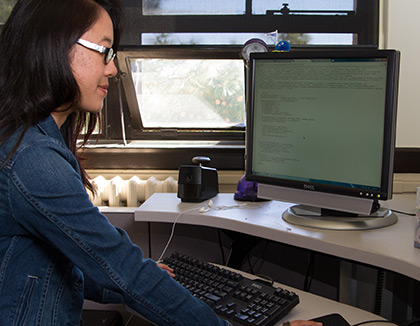Be the change, Code the Change
Christine Loh first heard of “Code the Change” in a Facebook post as a junior electrical engineering and computer science major in 2012. Shortly after, she and classmate Brian Tseng (Class of 2016) launched a Berkeley chapter of the national organization, began hosting a student-run course, and connected eager classmates with more than a dozen nonprofit organizations in need of technical help.
“We started by grabbing people from our existing tech-savvy networks, and it grew from there,” says Loh, who graduated last December.
 Recent EECS alumna Christine Loh co-launched the Berkeley chapter of Code the Change, an organization that pairs computer science students with nonprofit organizations to work on projects for the public good. (Photo by Preston Davis.)Code the Change was started at Stanford in 2009 and now works nationally to empower student programmers to use their technical skills for social good by partnering them with nonprofits. The organization also hosts Code Jams — hackathon-style blitzes designed to get large programming projects off the ground quickly. The group also provides career guidance for college students interested in using computer science as a tool for creating positive social change.
Recent EECS alumna Christine Loh co-launched the Berkeley chapter of Code the Change, an organization that pairs computer science students with nonprofit organizations to work on projects for the public good. (Photo by Preston Davis.)Code the Change was started at Stanford in 2009 and now works nationally to empower student programmers to use their technical skills for social good by partnering them with nonprofits. The organization also hosts Code Jams — hackathon-style blitzes designed to get large programming projects off the ground quickly. The group also provides career guidance for college students interested in using computer science as a tool for creating positive social change.
The students’ computer skills are in high demand. One student team created a patient navigation center for Asian Americans for Community Involvement, a nonprofit community organization that helps disabled patients arrange rides to and from the hospital. Another team designed a mobile app for Cal Opportunity’s Scholars Association, an organization that connects under-resourced students to important announcements, tools and events. While working for the public good, students gain real-world skills and experiences, including project management, marketing and consulting.
“We often have nonprofits reaching out to us or our national organization,” says Michael Lannin (Class of 2015), current president of Code the Change/Berkeley. “When we want more projects, we reach out to the Code the Change organization, which always has a backlog of projects ready to go.”
The “Code the Change” course is part of a university-run peer-to-peer learning program called DeCal. More experienced students design and implement computer science curriculum for more junior colleagues, who earn credit for the course. As they progress through the course, the level of responsibility increases. “The most rewarding moments for me have been seeing students eager to learn more so that they can work with nonprofits,” says Lannin.
Berkeley’s Code the Change chapter is now working on nine projects — tripling the number from last spring — ranging in scope from a data-visualization dashboard for a social enterprise to a database to promote service learning.
Founding and growing Berkeley’s chapter of Code the Change has had a profound effect on Loh, who will be joining the staff at EA Games, a popular gaming company, this summer.
“I can’t imagine my Cal experience without Code the Change,” says Loh. “It was definitely my most worthwhile involvement.”
